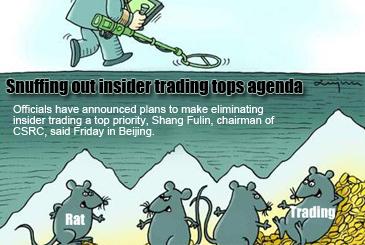
With Sunday marking the 20th anniversary of the Chinese mainland stock market, officials have announced plans to make eliminating insider trading a top priority, Shang Fulin, chairman of China Securities Regulatory Commission, said Friday speaking at the Caijing Annual Conference 2011 in Beijing.
Since Shanghai Stock Exchange rang the first market opening bell in December 1990, the last 20 years have seen the market value of China's stock market turn into the world's second largest following that of the US market.
As of September this year, the nation's two stock markets, the Shanghai and Shenzhen stock exchanges, reached a combined market value of $3.57 trillion, according to statistics from the World Federation of Exchanges.
As end of November, 2,026 companies in total were listed on the two exchanges. The stock markets have played an important role in about 40 percent in companies' merger and acquisition activities, according to Shang.
The China Securities Regulatory Commission has investigated 50 cases of insider trading this year alone, imposing administrative penalties on 19 people and three institutions, and transferred 15 cases to the Public Security Bureau, he noted. Major cases include involvement in insider trading by Xinjiang Kaidi Investment's general manager with acquiring target, Shenzhen-listed Xinjiang Tianshan Wool Tex Stock Co, and chairman and president of Shenzhen-listed Guangzhou Zhongshan Public Utilities leaking inside information to local government officials.
Since securities professionals like fund managers are not allowed to engage in trade, most cases involved secret trade deals conducted by relatives. One such case was Invesco's Tu Qiang, and Great Wall Fund Management Co's Liu Hai and Han Gang.
The fastest way to profit from the stock market is with insider information and that's why it's an issue, Xu Guangfu, strategy analyst with Xiangcai Securities, told the Global Times.
To best prevent the insider trading and protect the small investor's interests, regulators should impose more severe penalties on those breaking the rules, Xu said.
Xu also suggested that China's securities regulator take reference of the practice in Western countries, such as allowing professionals to trade openly but require them to disclose and prove that he is not engaged in insider trading.
That will prevent most insider trading, if not all of it, he said.





